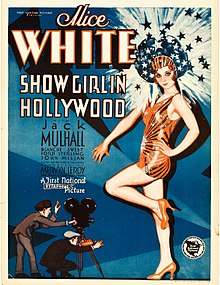Show Girl in Hollywood
| Showgirl In Hollywood | |
|---|---|

theatrical release poster
|
|
| Directed by | Mervyn LeRoy |
| Produced by | Robert North |
| Written by |
Adaptation: Harvey F. Thew James A. Starr Dialogue: Harvey F. Thew |
| Based on |
Hollywood Girl by J. P. McEvoy |
| Starring | Alice White |
| Music by |
Joseph Burke Ray Henderson |
| Cinematography | Sol Polito |
| Edited by | Pete Fritch |
|
Production
company |
|
| Distributed by | First National Pictures |
|
Release date
|
|
|
Running time
|
77 minutes |
| Country | United States |
| Language | English |
Showgirl in Hollywood is a 1930 American Pre-Code all-talking musical comedy-drama film with Technicolor sequences, produced and distributed by First National Pictures, a subsidiary of Warner Bros. The film stars Alice White, Jack Mulhall and Blanche Sweet. It was adapted from the 1929 novel Hollywood Girl, by J. P. McEvoy.
Al Jolson, Ruby Keeler, Noah Beery, Walter Pidgeon, and Loretta Young make cameo appearances in the final reel, which was photographed in Technicolor. Showgirl in Hollywood is a sequel to the 1928 Warner Bros. silent film Show Girl which also starred Alice White as Dixie Dugan.
A French version of the film, titled Le masque d'Hollywood, was directed by Clarence G. Badger and John Daumery.
When the film begins, a musical show before closed down before it has had a chance to even open. Jimmie Doyle (Jack Mulhall), who wrote the musical intends to rewrite it while his girlfriend, Dixie Dugan (Alice White), fed up at wasting her time for a show that never even opened, is intent on finding a new career. While at a nightclub, Dixie does a musical number and catches the eye of Frank Buelow (John Miljan), a Hollywood director. Buelow persuades Dixie to go to Hollywood, where he will have a part waiting for her in his upcoming films.
Dixie takes the next train to California. When she arrives, she is disappointed to find that Buelow has been fired from the studio and that there is no part for her. Dixie meets Donny Harris (Blanche Sweet), a former star who is now out of work because she is considered "as old as the hills" at the age of 32. Soon after, Dixie discovers that Jimmie Doyle is now in Hollywood because one of the movie studios had just bought the film rights to his musical play. Jimmie had insisted that Dixie be given the lead in the film version of his play. The film goes into production and Dixie manages to get Donny included in the cast.
...
Wikipedia
